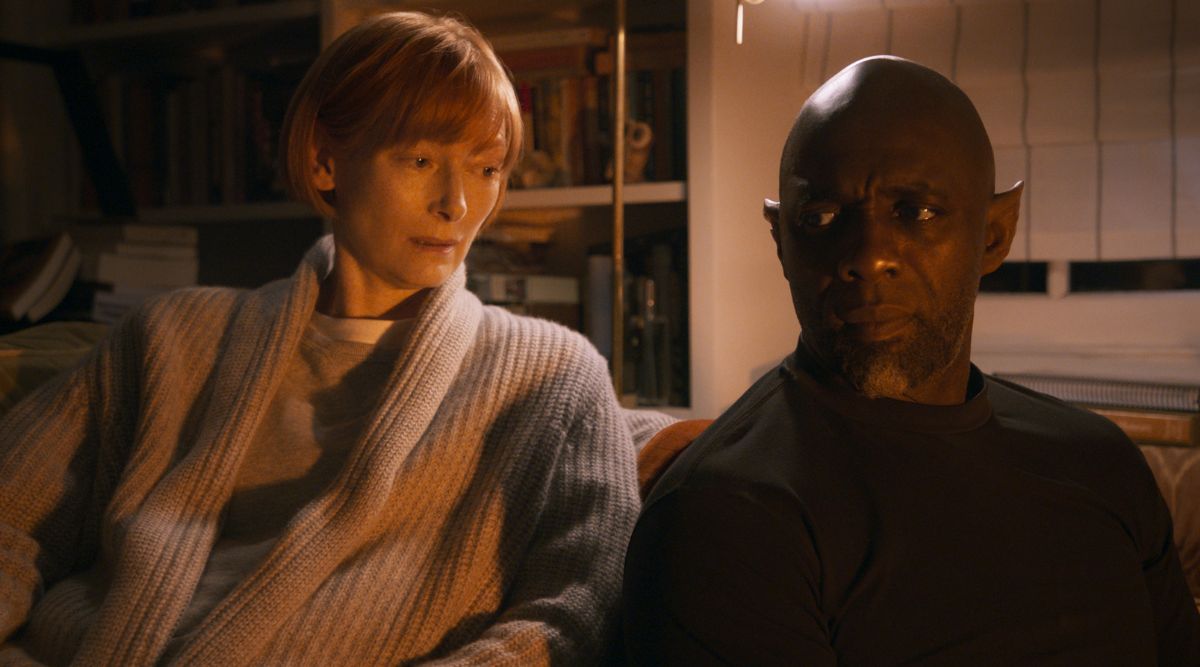 Idris Elba and Tilda Swinton in Three Thousand Years of Longing.
Idris Elba and Tilda Swinton in Three Thousand Years of Longing.Three Thousand Years of Longing movie cast: Tilda Swinton, Idris Elba
Three Thousand Years of Longing movie director: George Miller
Three Thousand Years of Longing movie rating: 2.5 stars
Djinn meets George Miller meets Arabian Nights, Three Thousand Years of Longing is not so much about longing as just being long. Admittedly not 3,000 years long, but really overstaying its welcome somewhere between its beginning as a promising exchange of science vs myth, reality vs fantasy, and its limp end as yet another love story where it’s a universal truth well acknowledged that a woman in possession of a serious degree and solemn glasses must be in want of a man.
Here the woman is a professor of narratology, Dr Alithea Binny (Swinton), who isn’t just an authority on a field such as that, but also who gets called for seminars to places such as Istanbul to talk about the same. On one of her many lonely but content mornings, as she is waiting for her breakfast at an Istanbul hotel, out pops a djinn from a trinket she has picked from the city’s Grand Bazaar.
Miller (Mad Max) is at his best here, imagining the creature as something distinctly otherworldly, made of wispy smokes and shiny gold dust. As that djinn eventually takes the shape of a more modest, though jarringly pointy eared, Elba, Alithea commendably holds her own.
Subscriber Only Stories
True to all that she has learned from her readings about the past, and her knowledge of the present, she repeatedly tells the djinn that she can’t be tempted into asking for the fabled three wishes. All wishing stories turn out to be cautionary tales about being careful what one asks for, she tells him.
And so, the djinn proceeds to tell her stories, starting with the Queen of Sheeba and Solomon two-and-a-half thousand years ago, to a dissolute prince some hundreds of years ago, to a girl who could, in our times, have been Einstein (a “wizard” in his own right, as the film tells you).
Miller is adept at whipping up these fantastical worlds, and keeping us entranced there. This saves the film when some of its enchantments veer towards bizzare caricatures of the mystical Orient.
They also seem a diversion from where the film should actually be, in the interplay between the world of realism as exemplified by Alithea and the world of chance as shown by the djinn. Miller and daughter Augusta Gore, who have adapted a short book for the screenplay of the film, clearly don’t trust their own storytelling enough to not constantly pull away.
The point, such as it is, of everyone needing love and company – be it a djinn trapped for centuries in a bottle, or a woman wrapping herself in loneliness of her own choosing (but of course not of her own choosing) – is obvious from the start.
The transfer of the setting in the latter half from a Turkish hotel room to Alithea’s very English, very serious home back in London sadly underlines the metaphorical even more as the literal.
One mystery is solved though: Can you have serious conversation while in a bathrobe? Well, now you know you can, almost for the entirety of a film’s length. Guess, when in Turkey, make the best of bathrobes.